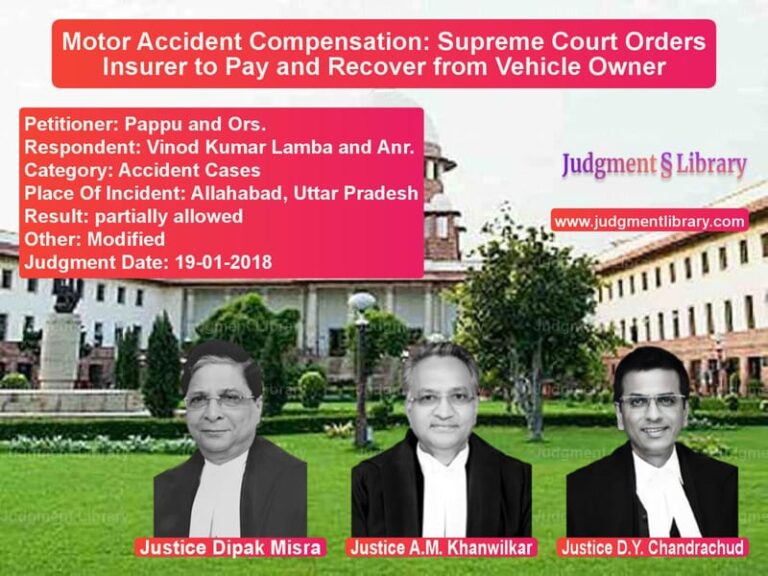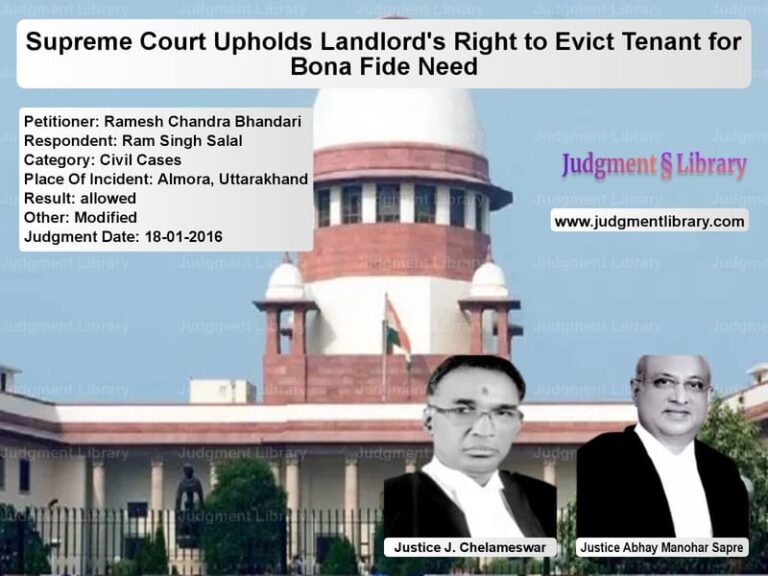Supreme Court Declares High Court Judgment a Nullity: Legal Representatives Not Substituted in Time
The Supreme Court of India, in the case of Gurnam Singh (D) Thr. Lrs. & Ors. vs. Gurbachan Kaur (D) By Lrs. & Ors., set aside a Punjab and Haryana High Court judgment on the ground that the appeal had abated due to the death of parties involved. The ruling highlights the importance of procedural compliance in legal proceedings, particularly the necessity of substituting legal representatives within the prescribed time when a party dies during the pendency of a case.
The Supreme Court held that since no legal representatives were brought on record following the death of the original parties, the High Court’s decision was a nullity and had no legal standing. The ruling reaffirmed the fundamental legal principle that courts lose jurisdiction to decide cases where procedural non-compliance leads to automatic abatement.
Background of the Case
The case originated from a property dispute in Punjab. The facts are as follows:
- Surjan Singh, the original owner of the disputed land, entered into a sale agreement with Gurbachan Kaur on May 6, 1974, agreeing to sell land measuring 43 Kanals and 4 Marlas for Rs. 10,000 per Killa.
- Before the sale deed could be executed, Surjan Singh sold the land to Joginder Singh, Mehal Singh, and Gurnam Singh on September 3, 1974.
- Gurbachan Kaur then filed a civil suit for specific performance of the sale agreement, seeking enforcement of the contract against Surjan Singh and the subsequent buyers.
Trial Court and High Court Proceedings
The trial court, in its judgment dated August 29, 1980, dismissed the suit for specific performance but granted Gurbachan Kaur a money decree of Rs. 7,000. The first appellate court upheld the trial court’s decision on November 6, 1984. Gurbachan Kaur, dissatisfied with the ruling, filed a Second Appeal before the Punjab and Haryana High Court.
While the second appeal was pending, key parties to the case died:
- Gurbachan Kaur (Plaintiff) – Died on May 10, 1994
- Joginder Singh (Defendant No. 2) – Died on December 6, 2000
- Gurnam Singh (Defendant No. 4) – Died on April 19, 2002
Despite these deaths, no legal representatives were substituted in their place, and the case proceeded without compliance with procedural requirements.
Arguments by the Petitioners (Legal Representatives of Defendants)
The petitioners, representing the deceased defendants, challenged the High Court’s ruling, arguing:
- The High Court erred in deciding the case when the original plaintiff and two defendants had already died.
- Since no substitution applications were filed within 90 days of death, the appeal had automatically abated under Order 22 of the Civil Procedure Code (CPC).
- The High Court had no jurisdiction to pass any judgment on a case that had already abated due to procedural non-compliance.
Arguments by the Respondents (Legal Representatives of Plaintiff)
The respondents countered these claims, asserting:
- The case should be decided on its merits, and procedural lapses should not deprive them of their substantive rights.
- Failure to substitute legal representatives should not invalidate an otherwise just and fair judgment.
Supreme Court’s Observations
The Supreme Court examined the procedural lapses and reaffirmed the principle set in Kiran Singh vs. Chaman Paswan (AIR 1954 SC 340), holding:
“It is a fundamental principle that a decree passed by a Court without jurisdiction is a nullity, and that its invalidity can be set up whenever and wherever it is sought to be enforced or relied upon.”
The Court further emphasized:
“On the death of a party to the appeal, if no application is made for substitution of their legal representatives within 90 days, such appeal abates automatically on expiry of 90 days from the date of death of the party.”
The Court also referred to Order 22 Rules 3(2) and 4(3) CPC:
“Where within the time limited by law no application is made, the suit shall abate as against the deceased defendant.”
Final Judgment
The Supreme Court ruled that the High Court’s judgment was a nullity as it had been delivered in a case that had already abated. It held:
“We allow the appeal and set aside the impugned judgment of the High Court. The High Court lacked jurisdiction to decide the appeal after it had abated due to the non-substitution of legal representatives.”
Legal Significance of the Judgment
The ruling establishes the following legal principles:
- Procedural compliance is essential: Courts cannot bypass mandatory procedural requirements, especially those governing abatement and substitution.
- A decree against a deceased person is void: Any ruling delivered in favor of or against a deceased person without proper substitution is a nullity.
- Courts lose jurisdiction upon abatement: If a case abates due to failure to substitute legal representatives, courts cannot adjudicate on the merits of the case.
Impact on Future Cases
The judgment reinforces critical procedural requirements in legal proceedings:
- Legal representatives must be substituted within the 90-day period to prevent automatic abatement.
- If an appeal abates, it cannot be revived unless proper applications are filed and allowed by the court.
- A decree passed against a deceased person is unenforceable and can be challenged at any stage.
Conclusion
The Supreme Court’s decision in Gurnam Singh (D) Thr. Lrs. & Ors. vs. Gurbachan Kaur (D) By Lrs. & Ors. underscores the necessity of procedural diligence in litigation. By setting aside the High Court’s judgment as a nullity, the Court reaffirmed that procedural rules must be strictly adhered to and that failure to do so results in the automatic termination of legal proceedings.
This judgment serves as a crucial reminder that compliance with legal procedures is not merely technical but a fundamental requirement for ensuring justice.
Don’t miss out on the full details! Download the complete judgment in PDF format below and gain valuable insights instantly!
Download Judgment: Gurnam Singh (D) Thr vs Gurbachan Kaur (D) B Supreme Court of India Judgment Dated 27-04-2017.pdf
Direct Downlaod Judgment: Direct downlaod this Judgment
See all petitions in Succession and Wills
See all petitions in Landlord-Tenant Disputes
See all petitions in Contract Disputes
See all petitions in Judgment by R K Agrawal
See all petitions in Judgment by Abhay Manohar Sapre
See all petitions in allowed
See all petitions in supreme court of India judgments April 2017
See all petitions in 2017 judgments
See all posts in Civil Cases Category
See all allowed petitions in Civil Cases Category
See all Dismissed petitions in Civil Cases Category
See all partially allowed petitions in Civil Cases Category







